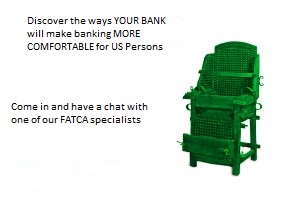To help you judge if,
your experience with your local bank, credit union or insurance company (or as the US defines them: “foreign financial institutions”) will be a comfortable one, as some advertise,
shared here are excerpts of notes from a meeting set up with a “US Person” and Canadian husband by a Vice-President of the wealth management branch of one of the Big Five Canadian banks:
1. ..all previous recommendations for changing investments have been done by telephone… In all the years as clients, they never requested a meeting with us.
2. re green card assumption and location of the company worked for (this question is one way to find out if a person has worked in the USA). *(see below)
3. Bank representative met with each of US Person and Canadian husband alone as they do not have joint accounts.
…wanted to sell US Person’s non-registered mutual funds and give the cash back to local branch of the bank (it is not worth their while “all the paperwork” to accept clients with less than $500K!!!!) US Person refused….had asked on numerous occasions for the names of PFIC compliant funds. At the end of the meeting he agreed to come up with a list of PFIC compliant funds. Until 10 days ago he did not know the meaning of PFIC. Asked why he would sell me mutual funds if other investment companies have known about the IRS rules since 2010. His answer: “we’re not expected to know – we ask people to check with their tax accountant” Then he asked ME if it is OK to have mutual funds in an RRSP.
4. … asked to do a review of our net worth. When I told him that for the past five years my annual gross income is about $23,000, he looked horrified. US Person says “I don’t think I fit the “wealth management” profile, even if I were not a US person.” He kept asking about credit lines – three times and looking at me each time. Non-US husband uses credit line. It is important the other US persons know that credit lines will count in their highest and year end balances for FBARs and FATCA tax forms 8938, and of course in the aggregate $50K US that the banks will report to CRA.
5. US Person asked him how many accounts the “wealth management” part of this bank has with Canadians with US connections. He replied “not as many as you think”. US Person said that she should have replied “by the time you get through with turning over all the names of people with US indicia, you could be looking at 200,000 or more (dividing the one million US persons among the big five) Canadian clients that you will lose!”
6. Same story about registered accounts being exempt – this V.P. could not grasp the concept of US persons being thrown under the bus (did not bother to try to explain – and his office spent hours writing letters etc. when my very savvy (sarcasm) IRS agent could not understand that the separate tax slips for each mutual fund were declared on both my Canadian and US returns. “This V.P. knew about the monstrous fine, but I am sure he must think that I am one of those tax cheats you read about in the newspapers.” AND, the head office used to issue 1099 forms, but this stopped in 2011.
Comment by US Person after this experience: Wealth management V.P. said that the reason for all the paperwork was because of 9/11 – does he think we are as ignorant as he is?!
Definitely an uncomfortable experience.
*US Person said from separate meetings V.P. assumed that Canadian husband had a green card and that he had lived and worked in the USA. Canadian husband wrote letter saying that he worked for an international company for almost 40 years in three different countries but NEVER worked or lived in the USA. He has only one citizenship, Canadian. Canadian husband told the V.P. that he did not have permission to send his Canadian citizen private financial information to CRA for onward forwarding to the IRS.
Canadian husband also asks for copies of all documents signed the day before (should they have been changed after the fact). …and finds it rather odd to have to give the name and location of the company he retired from 13 years ago (before 9/11), as a source of investments.






@WhiteKat, can you imagine how pissed off those not in the know are going to be when they start receiving letters from a foreign revenue agency (IRS)? Although, they might just think it’s a scam and throw it out without a second thought.
Without a tax ID number what is the IRS going to do? How will they know that Joe Smith at 123 Anywhere Road in Canada hasn’t filed his US taxes? Will they call him up to inquire? He’ll think they’re scammers and hang up.
The IRS will take the place of Nigerian scammers. People will either ignore them or swear at them and hang up. Are they going to send anybody to Canada to uphold their laws? I don’t think so. Maybe if enough Canadians hang up on them they’ll get the message.
It’s a set up, but as Em in her eloquent rant has stated, it will blow up in the bank’s faces. To inform their front line staff about FATCA at this point will set the fuse. I’d feel incredibly blindsided by my employer if I had to find out about FATCA from a customer, especially at this stage of the game.
Maybe the banks are holding out for the last moment, in the remote possibility that FATCA will be repealed or modified as to not affect the front line staff.